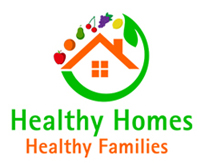

Healthy Homes/Healthy Families
 The EPRC core research, funded by the CDC and guided by our Community Advisory Board in southwest Georgia, included the Healthy Rural Communities study, which qualitatively and quantitatively explored the relationships between diet, physical activity, and tobacco use across three settings (home, church, and worksite). This study informed the development and testing of a coach-based intervention to prevent weight gain among adults. The intervention, called Healthy Homes/Healthy Families, is an environmental change intervention. Coaches work with families to make changes in their home so that both their social and physical home environments are more supportive of healthy eating and physical activity.
The EPRC core research, funded by the CDC and guided by our Community Advisory Board in southwest Georgia, included the Healthy Rural Communities study, which qualitatively and quantitatively explored the relationships between diet, physical activity, and tobacco use across three settings (home, church, and worksite). This study informed the development and testing of a coach-based intervention to prevent weight gain among adults. The intervention, called Healthy Homes/Healthy Families, is an environmental change intervention. Coaches work with families to make changes in their home so that both their social and physical home environments are more supportive of healthy eating and physical activity.
 After a pilot test of the intervention, our first Healthy Homes/Healthy Families randomized controlled trial began in early 2011 and was completed in the summer of 2013. Patients from three federally qualified health centers in southwest Georgia participated in the study. Those randomized to the intervention group were coached by staff trained by the EPRC and the Cancer Coalition of South Georgia (now named Horizons Community Solutions). The 5-month intervention was delivered through three home visits, four coaching calls, and four mailings of support materials. Coaches used two primary tools to guide families into creating healthier home environments: a Home Environment Profile, which is tailored to each home using baseline data, and a menu of Healthy Actions, which consists of strategies to make the home more supportive of healthy eating and physical activity. Participants randomized to the control group received three mailings of health education materials related to diet and physical activity. Data were collected via telephone interviews at baseline and at 6 and 12 months post baseline using a home environment survey, two 24 hour dietary recalls, a physical activity recall, and accelerometers.
After a pilot test of the intervention, our first Healthy Homes/Healthy Families randomized controlled trial began in early 2011 and was completed in the summer of 2013. Patients from three federally qualified health centers in southwest Georgia participated in the study. Those randomized to the intervention group were coached by staff trained by the EPRC and the Cancer Coalition of South Georgia (now named Horizons Community Solutions). The 5-month intervention was delivered through three home visits, four coaching calls, and four mailings of support materials. Coaches used two primary tools to guide families into creating healthier home environments: a Home Environment Profile, which is tailored to each home using baseline data, and a menu of Healthy Actions, which consists of strategies to make the home more supportive of healthy eating and physical activity. Participants randomized to the control group received three mailings of health education materials related to diet and physical activity. Data were collected via telephone interviews at baseline and at 6 and 12 months post baseline using a home environment survey, two 24 hour dietary recalls, a physical activity recall, and accelerometers.
We saw significant changes in the home food and activity environments and food-related behaviors of participants in the study. More recently, we completed an NCI-funded pilot and feasibility trial to adapt this intervention for telephone-based delivery with 2-1-1 clients in partnership with United Way of Greater Atlanta 2-1-1. The adapted intervention focused on the nutrition-related component of the original intervention and included six coaching calls and six text messages, delivered weekly, reducing the intervention from 16 weeks to 12 weeks.
Results from the pilot showed a significant increase in the Healthy Eating Index, decreases in kcals per day and self-reported weight, improvements in household food inventories, fewer family meals from non-home sources (e.g. less eating out), and more.
Current Healthy Homes/Healthy Families 2-1-1 Study
Currently, four 2-1-1 United Way agencies, in Albany, Macon, Columbus, and Atlanta, are participating in a hybrid effectiveness-implementation trial funded by CDC. We have enrolled over 500 2-1-1 callers and are assessing the effectiveness of telephone delivery of the intervention. Participants are recruited and pre-screened by 2-1-1 community connection specialists. Potential participants are then contacted by the EPRC to confirm eligibility, obtain verbal consent, and complete baseline interviews. Those assigned to the intervention group receive the 12-week intervention, delivered by one of our trained health coaches. Similar to the original Healthy Homes/Healthy Families intervention, coaches promote healthy eating by using two primary tools to guide families into creating healthier home environments: a Home Food Environment Profile and a menu of Healthy Actions. The Home Food Environment Profile is customized based on baseline data, and the Healthy Actions menu consists of eight simple strategies to support healthy eating at home. We collect data through two telephone 24-hr dietary recalls at baseline and again at four and nine months, a home environment follow-up survey, and a qualitative interview after the intervention.
This phase of the research will also involve a small grants program to identify effective scale-out partners and models for translation of Healthy Homes/Healthy Families.
For a list of publications and to request sample materials from Healthy Homes/Healthy Families, click here.